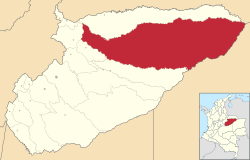
Cartago is a city in southwestern Colombia, about 187 miles west of Bogotá. It is in the extreme northern portion of the Valle del Cauca Department. It is located very close to the city of Pereira, about a 20-minute drive. It is the fourth largest city in Valle after Cali, Palmira, and Tuluá. In 2019, it had a population of approximately 135,000 inhabitants.
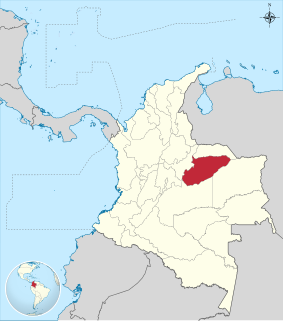
Casanare Department is a department in the central eastern region of Colombia.

Belgrano is a leafy, northern barrio or neighborhood of the city of Buenos Aires, Argentina.

Quibdó is the capital city of Chocó Department, in western Colombia, and is located on the Atrato River. The municipality of Quibdó has an area of 3,337.5 km² and a population of 129,237, predominately Afro Colombian and Zambo Colombians.
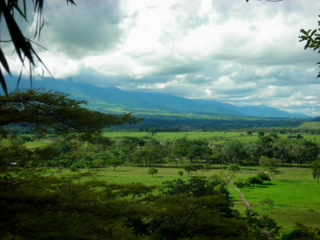
Los Llanos is a vast tropical grassland plain situated to the east of the Andes in Colombia and Venezuela, in northwestern South America. It is an ecoregion of the flooded grasslands and savannas biome.

Comendador is the capital of the Elías Piña province of the Dominican Republic. It has a border crossing to the Haitian town Belladère.

The Meta River is a major left tributary of the Orinoco River in eastern Colombia and southern Venezuela, South America. The Meta originates in the Eastern Ranges of the Andes and flows through the Meta Department, Colombia as the confluence of the Humea, Guatiquía and Guayuriba rivers. It flows east-northeastward across the Llanos Orientales of Colombia following the direction of the Meta Fault. The Meta forms the northern boundary of Vichada Department, first with Casanare Department, then with Arauca Department, and finally with Venezuela, down to Puerto Carreño where it flows into the Orinoco.
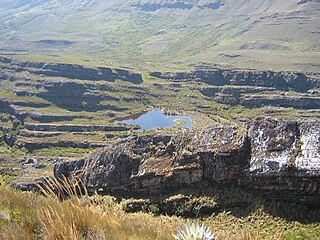
Pisba is a town and municipality in Boyacá Department, Colombia, part of the subregion of La Libertad Province. Pisba is situated in the Eastern Ranges of the Colombian Andes at altitudes between 2,400 metres (7,900 ft) and 3,500 metres (11,500 ft). Distance to Sogamoso is 128 kilometres (80 mi) and to Tunja 176 kilometres (109 mi). The municipality borders Paya in the east, Labranzagrande in the south and Mongua in the northwest. The Casanare municipality Támara borders Pisba in the north.

The Guahibo people are an indigenous people native to Llanos or savannah plains in eastern Colombia–Arauca, Meta, Guainia, and Vichada departments–and in southern Venezuela near the Colombian border. Their population was estimated at 23,772 people in 1998.

Lloró is a municipality and town in the Chocó Department, Colombia. It claims the second world record for highest average annual precipitation with 12,717 mm (501 in), after López de Micay, which holds an also disputed record with 12,892.4 mm (508 in). The official record is held by Mawsynram, India. The rainfall data was measured in its Agricultural Farm, managed by the University of Bogotá, between 1952 and 1989. If accurate, that would make it the wettest place in the world. The town is named for Gioró, a pre-Columbian indigenous chief.

Nóvita is a municipality and town in the Chocó Department, Colombia.

Chámeza is a town and municipality in the Department of Casanare, Colombia.

Támara is a town and municipality in the Department of Casanare, Colombia. The urban centre is located at an altitude of 1,156 metres (3,793 ft) at a distance of 95 kilometres (59 mi) from the department capital Yopal. It borders in the north Sacama, in the east Pore and Paz de Ariporo, in the west Socotá of the department of Boyacá and in the south Nunchia and Paya, Boyacá.
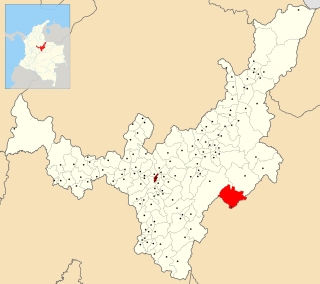
Pajarito is a town and municipality in the La Libertad Province, part of the Colombian department of Boyacá. The municipality, situated in the southeast of the department borders Labranzagrande and Aquitania of the department of Boyacá and Yopal, Recetor and Aguazul of the department of Casanare. The urban centre is located at a distance of 147 kilometres (91 mi) from the department capital Tunja at an altitude of 800 metres (2,600 ft) in a tight valley, not allowing much expansion of the urban area. The centre is experiencing periodic landslides.
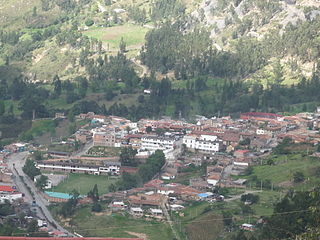
Tasco is a town and municipality in the Valderrama Province, part of the Colombian department of Boyacá. Tasco is situated on the Altiplano Cundiboyacense at altitudes ranging from 2,400 metres (7,900 ft) to 3,800 metres (12,500 ft). The Chicamocha River flows through the municipality which borders Socha in the north, Corrales and Gámeza in the south, Socotá in the east and Betéitiva and Paz de Río in the west. The urban centre is located at an altitude of 2,530 metres (8,300 ft) at 115 kilometres (71 mi) from the department capital Tunja.

Puracé is a town and municipality in the Cauca Department, Colombia.
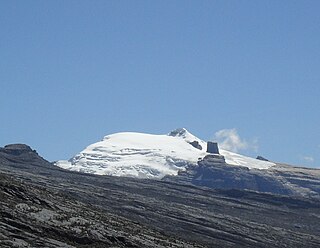
The Sierra Nevada del Cocuy Chita o Guican National Natural Park (or Sierra Nevada de Chita or Sierra Nevada de Güicán, Spanish: Parque Natural Sierra Nevada del Cocuy Chita o Guican is a national park and a set of highlands within the Cordillera Oriental mountain range in the Andes Mountains of Colombia.
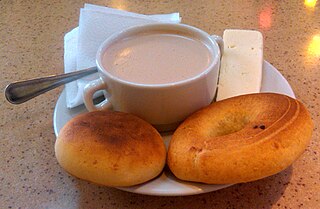
Pan de yuca is a type of bread made of cassava starch and cheese typical of southern Colombia and the coastal region of Ecuador.
Saliba is an indigenous language of Eastern Colombia and Venezuela. Saliba was used by Jesuit missionaries in the 17th century to communicate with indigenous peoples of the Meta, Orinoco, and Vichada valleys. An 1856 watercolor by Manuel María Paz is an early depiction of the Saliva people in Casanare Province.
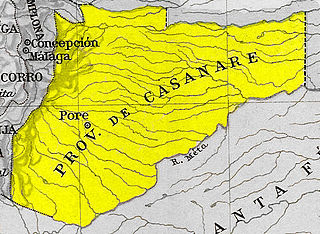
Casanare Province was one of the provinces of Gran Colombia.

